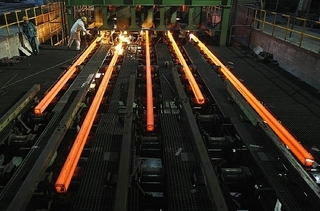 |
|
|
Steel industry stocks have been fluctuatingthis year following the trend of the general market. From the first tradingsession of the year to mid-June, shares of giant steel maker Hoa PhatGroup (HPG) fell by 0.069 percent and Nam Kim Steel Joint StockCompany (NKG) moved little, its shares inching down from 6,140 VND pershare to 6,100 VND. Hoa Sen Group (HSG) and Vietnam Steel Corporation (TVN)went up and down during the period.
Le Duc Khanh, chief economist and chiefstrategy officer at PetroVietnam Securities JSC (PSI), said the US FederalReserve was likely to reduce interest rates in July, but Vietnam waslikely to suffer pressure over the rest of the year from inflation, exchangerates and rising interest rates, which would make it difficult for steelenterprises.
Other factors likely to have a big impact onthe industry are geopolitical changes, the escalating US-China trade war, andthe lack of steel supply caused by the damaged waste reservoir at the iron oremine in Brumadinho, Minas Gerais State, Brazil, Khanh said.
He said the real estate market still hadroom for development in the remainder of 2019, so steel stocks werecertain to find development opportunities. However, growth would depend much onthe prestige of the business because customers only select high-qualityproducts with competitive prices.
According Nguyen Duy Dinh, a stock analyst atMB Securities Co, the steel industry is facing difficulties related to highinput costs such as electricity prices, oil prices and ore prices.However, steel enterprises with large-scale production can still earn contractsfrom major construction projects or find new export markets.
According to MB Securities Corp (MBS),demand in Vietnam is expected to increase by about 10 percent for long steeland flat steel products. Most of the industry's long steel output is consumeddomestically, while about one third to one half of flat steel is exported.
For long steel, MBS forecasts consumption atapproximately 12 million tonnes in 2019, accounting for 68 percent of total consumption.For galvanised steel products, consumption will be at 4.5-5 million tonnes.
Steel enterprises also face difficultiesinternally. Some businesses have a very high debt-to-equity ratio, which putspressure on cash flow.
The analysis group from MBS said thenumber of industrial projects may rise thanks to the increase in foreign directinvestment (FDI) and public spending on the infrastructure. Infrastructurespending in Vietnam has been growing at a double digit rate eachyear since 2012.
The defensive tax on imported steel isset to expire in 2021. However, with the increase of protectionismaround the world and the importance of the steel industry for Vietnam, thetax is likely to be re-applied, which will put pressure on many exporters, MBSsaid.
The company predicted that Vietnam'ssteel industry will thrive in the long term due to the favourable macroeconomicenvironment and potential FDI flows.
According to the Vietnam Steel Association,in the first five months of 2019, steel production reached more than 10.5million tonnes, up 9.2 percent over the same period in 2018. Sales of steelproducts reached more than 9.7 million tonnes, an increase of 11 percent, andsteel exports hit 2 million tonnes, up 6 percent.-VNS

Vietnam's steel industry to face challenges in second half of 2019
Vietnam's steel industry, vietnam economy, Vietnam business news, business news, vietnamnet bridge, english news

New steel projects bewilder producers
The total designed capacity of the domestic cold-rolled steel industry reached more than 700,000 tonnes, so local producers now can only run at about half of their designed capacity, according to the petition.

VN levies anti-dumping duties on colour-coated steel sheet imports
The Ministry of Industry and Trade has announced temporary anti-dumping duties on colour-coated steel sheets originating from China and the Republic of Korea, which take effect from June 25.
 In the second half of this year, increasing competition in product quality, prices and market share are predicted to force steel companies to work harder to maintain their foothold in the market.
In the second half of this year, increasing competition in product quality, prices and market share are predicted to force steel companies to work harder to maintain their foothold in the market.